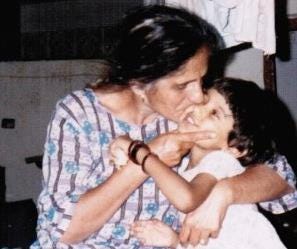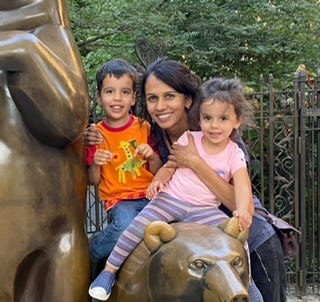Why Public School Education is So Important To Me
As a Pakistani immigrant, witnessing school closures was like witnessing a mass catastrophe-- but one that was cheered on by our government and cultural leaders. By Sumayya Ahmad
We first met Sumayya early last spring, after NYC dropped the school mask mandate for everyone— except toddlers. At the time, many of us thought it was simply an error that would be quickly rectified. When the “Toddler Mask Mandate” endured, a small but dedicated group of parent advocates came together to demand that the youngest in NYC be unmasked. Sumayya was one of the most vocal parents in this group. She came to every rally and even spoke at some of them. When the toddler mask mandate was finally lifted, we interviewed Sumayya here.
Like our friend Hien Sosa, Sumayya is also both an immigrant and a health care worker, an original voice in the crowd.
We hope Sumayya inspires you as much as she does us.
-Natalya and Dana
My family moved to the United States when I was four; my parents worked all kinds of jobs while I attended public school. Eventually I became a doctor, achieving educational and economic success that had been out of reach for my own parents. However, when schools closed for COVID-19, I saw millions of children in the same situation lose their chances at the opportunities I had.
My journey toward medicine and advocacy started in high school, when I was on a trip to Pakistan with my mother. While visiting the village she grew up in, we saw a young boy of about 8 who had disfigured legs and was using crutches. He had polio, a rare infectious disease that has been mostly eradicated except for Pakistan and Afghanistan. While watching this small child, who was stumbling on an uneven dirt road with his crutches on and didn't attend school, I felt both indignant and motivated. It seemed unfair that he, a small boy who happened to be born to the wrong family, would likely never leave that village, whereas my own future seemed limitless because I lived in the U.S. and attended school. Seeing this level of poverty, I felt like I had an obligation to help people like him. The next step seemed obvious: studying medicine would allow me to do that.
After this trip, I was still in high school but I began working with international aid and advocacy organizations such as Operation Smile. I would continue working with non-profits such as Edhi (a Pakistani charity) in college and Physicians for Human Rights in medical school. Once in medical school, I decided to become an ophthalmologist, and dove head-first into my training. After finishing my fellowship in 2016, I moved to NYC and began to work in Queens.
The population in Queens was exactly what I was looking for: an immigrant population who needed my help; I also knew that the range of medical conditions would be intellectually challenging. I love my practice: I have patients who are Turkish and Latin, Black and Bengali. Many work in the tourism industry as taxi drivers and food cart vendors. Their jobs are demanding with long hours. And, like my own parents, my patients are motivated to continue their hard work so that their children can have educational opportunities. They came to the U.S. for economic opportunity, but they stayed for the education of their children.
When NYC locked down in March of 2020, I was seven months pregnant and not very fearful. Instead, I felt a great sense of responsibility. I believed deeply that now was the time to do as much as I could to alleviate the suffering of the community around me. I set up a remote program in my hospital to help my overwhelmed hospitalist colleagues and brushed up on internal medicine so that I could answer questions for family members who were unable to get through to talk to the hospitalists. I knew the odds were overwhelmingly in my favor, as the virus seemed to mostly affect the elderly. I continued to see my own patients while wearing my N95 and taking the subway, and hoped that by the time I had given birth and returned to work, NYC would be normal again.
I returned to work in late 2020, but I realized things were far from normal and it stayed that way well into late 2021. My patients were suffering, but not from COVID. The taxi drivers were depressed for lack of work; a patient who worked in the restaurant of a large hotel was furloughed and then ultimately fired because the hotel closed down. He hadn't intended to retire so early, but he had no choice. Other patients couldn't afford their eyeglasses because they worked as waiters and restaurants had closed. Yet another patient's daughter had depression after more than a year of remote college. What struck me was that their stories were left out of the cultural discourse. The media had decided that COVID 19 had eclipsed all other ailments or problems. Depression, under- and unemployment, inability to get basic medical care due to lack of insurance—none of that mattered. Even worse, most public schools in NYC didn’t fully reopen until spring 2021. Even though the virus' threat retreated from the hospital I worked in, the policies related to the virus (opening businesses and schools, wearing masks in public) remained or worsened.
As a child of immigrant parents, I knew that education had been the way for me to have a better life than my parents. I knew that was also the case for many kids around the country. My family would not have been able to afford private tutoring or pods while growing up. Social media was not a thing in the 1990's--but had it been, I likely wouldn't have had the attention span to do well in school, much less in remote school. I very well might not have become a doctor today if I had had as many distractions as children do in 2022. Coupled with school closures and disruption, the young me likely wouldn't have stood a chance.
While the importance of in-person school was glaringly obvious to me, it was not to the society I lived in. Witnessing school closures was like witnessing a mass catastrophe-- but one that was cheered on by our government and cultural leaders--and which many others were afraid to speak against. After posting a few of my thoughts about this on Facebook, I knew many did not agree with me. I found myself self-silencing, because I knew that my opinion was not mainstream. However, through other social media, I found like-minded parents in NYC, like Natalya, as well as a group of doctors from around the country that were battling the narrative and questioning school closures and other irrational policy decisions. Finding these people helped me to get through a dark time, and I am so grateful for them.
By March 2022, I had had enough. While my friends in most of the country were free from quarantines and masks on their children, toddlers in NYC continued to be masked, with public health officials using the lack of a vaccine as an excuse. I was incredulous--the ratio of hospitalized toddlers had not increased since March 2020--but here we were, with the worst restrictions on those the least affected. It seemed like a parody.
I decided to channel my anger toward activism. I found other parents who were fighting the same battle. We organized protests, spoke to the media, and called our elected officials. A fellow activist physician mom, Megan Martin, and I, wrote op-eds advocating against the toddler mask mandate and quarantines. The toddler mask mandate in NYC was removed in June, and quarantines were finally removed in daycares just just weeks ago. While the narrative is slowly changing around school closures and other COVID-related policy blunders, it's a shame they happened in the first place--and for so long.
I will not forget the two years of stolen childhood that many children will never get back. A friend's daughter failed multiple classes and still struggles in school today. Others left school and never came back. I also know that many of these stories could have easily been mine, a young child in a working-class family whose only stepping stone to a better life was education. We will also likely see higher poverty in this generation than in the past.
My heart breaks for these children, the way it broke when I saw that small child with polio in Pakistan in 1999. There's a long road ahead and much work to be done. I sincerely hope that we absorb the many lessons from this difficult time to secure a better future for our own and our nation's children.
I, for one, am committed to doing everything I can.
Sumayya Ahmad is a practicing ophthalmologist in NYC with two young children, including a four-year-old in public pre-K. Follow her at @sumayya1985.







